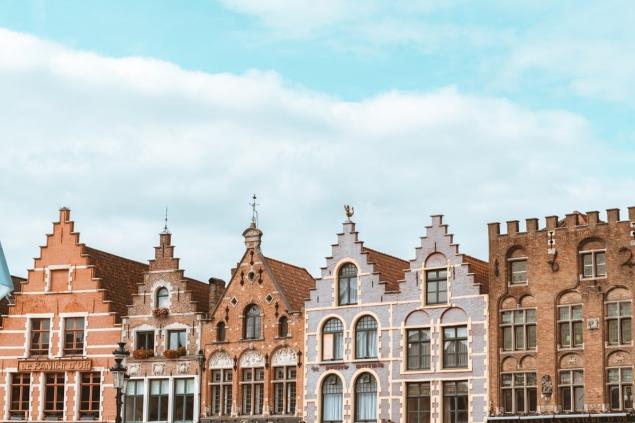183
We used to dream of life abroad, but now it has become clear that it is not so fabulous.
Recently I came across a touching post of my countrywoman, who by the will of a difficult fate was far from home. Like many people, she left because of the war. Honestly, I read and almost wept. I am also away from home and I know that westernism It’s not like it’s shown in the movies. Unless you're local, of course.
And although the heroine of my story is now in Ireland, her situation is no easier. Friends offered to help her settle in a new country, but things didn’t go according to plan. She can’t go back – there is no stone left on the stone. And the closest relatives in the home are not in a hurry to call. only envy. Well, if they knew what was going on, they'd certainly be tempered. I want to share with you the main problems that migrants face these days.
Life in Western Europe and the Challenges It Brings
Unsplash Move abroad It's not easy at 40 or 50. It seems to young people that it is only necessary to cross the border, as soon as all opportunities open up. But even when that is not the case, their enthusiasm and strength are enough to overcome all difficulties. However, the older the person, the harder it is to do it. So for example, the woman whose story hooked me moved in at 42 and did it all alone. She describes her experience as follows:
“I have no husband or children. All women my age have a good reason to do their best in a foreign land. They do it. childishI want them to stay away from the horrors that are happening at home. They have common interests, they come together and help each other. I'm all alone here.

Unsplash began her journey in Poland. I went to the program when there was nothing left of the house. In Poland, she and other women were placed in a dormitory, helped to draw up some documents, but that’s all. Neither knowledge of the language, nor work, nor even housing could be found suitable. Old connections were saved from complete despair - a classmate invited to try her luck in Ireland. So there was work, and even housing, and everything seemed to be fine. But happiness from this did not increase, the depression only intensified. Why is that? All the fault of the immigrant syndrome or, as it is also called, Ulysses syndrome. As it begins, read below.
The nuances faced by migrants in Western Europe The first impression is usually positive, especially among the younger generation. Clean shiny streets, beautiful architecture and thoughtful urbanism do their job. At first, it seems as if I got into some computer game, because the eye does not cling to any wrong angle. There is no noise at night, there are friendly policemen everywhere. perfect (to exaggerate, of course). You can find graffiti, suspicious areas, and even garbage, but in incomparably smaller quantities than in other places. Eastern Europe.

Unsplash is, of course, shocking to many. The standard of living, variety and availability of all kinds of products and equipment, too. Packaging sausages and red fish comes at the same price, one avocado can cost two to three times cheaper than the fare on public transport. Life in Western Europe It is good because it provides basic needs and gives a sense of comfort. Even those people who are on the provision can afford a variety of food and leisure. However, even these conditions are too few to close. primary human needs.
The first obstacles: language barrier and isolation Oh, foreign languages, especially German, are hard for our people. But little by little everyone learns: both students and mothers with many children. However, it is still a great stress: errors in filling out documents, disorientation in addresses and names, constant apologies to the locals for their language. Add to this the inability to understand for a long time what others say. And the social isolation that comes with it.

Unsplash is where the so-called Unsplash begins. immigrantism A feeling of irrelevance and alienation. Everything else, incomprehensible, alien. You are a stranger and a stranger in this country.
The more time passes, the more distant the relatives. Correspondences with former colleagues and acquaintances slowly subside, old contacts die off. And it seems that there is no life in a foreign land, and no one in the homeland. With the exception of close relatives, they are always connected and longing for them. push back Most of them.
With the move of the person’s personality undergoes great changes, from worldview to trifles. You used to like cottage cheese and jam for breakfast, but now where do you get this cottage cheese? However, people adapt to the food industry in about three to four months. But the longing for favorite dishes does not go away so easily.

A person begins to change in a completely unexpected direction: schedules and habits change, many people are afraid of it. Some migrants describe this feeling as loss.
Now is such a time that complaining about depression in exile is a bad tone. Especially local! After all, no one abolishes xenophobia and not all Western European I am delighted with the influx of migrants. It's hard to complain at a party, right?

And your people who stayed at home, too, will not cry, how hard it is. adjust. They have their own problems, and they seem much more serious. Moreover, many relatives and do speak only with envy or admiration about the departure of someone close. Surely. Western Europe It seems like a fairy tale to some.
Problems with employment
Unsplash It's not true that you can't find a job here. There is work, and there is enough of it – enough for everyone. But you need to understand that this is a job designed for low-skill. The kind of work that the Germans, the Poles and the French will not do. And this is the service sector: restaurant service, cleaning, construction work, sorting of goods in warehouses, harvesting.
In Eastern Europe, where we come from, more than 80 percent of people graduateAnd that's a very high number. To many of our countrymen, digging in the mud or in the dishwasher seems something sinful. Therefore, some people sit on payments and wait for a job offer in their profession. And this, unfortunately, without a corresponding European diploma is almost impossible.

However, over time, even this passes, or rather, overcomes. Moving to another country (under all circumstances) is almost never easy. But for us Eastern Europeans, it is much more difficult. We're not nomads! He is always drawn to his native land and native people. And this craving persists for decades, even when things seem to be getting better. You'd risk moving and start off? If you have already taken the risk, share your experience in the comments.
And although the heroine of my story is now in Ireland, her situation is no easier. Friends offered to help her settle in a new country, but things didn’t go according to plan. She can’t go back – there is no stone left on the stone. And the closest relatives in the home are not in a hurry to call. only envy. Well, if they knew what was going on, they'd certainly be tempered. I want to share with you the main problems that migrants face these days.
Life in Western Europe and the Challenges It Brings

Unsplash Move abroad It's not easy at 40 or 50. It seems to young people that it is only necessary to cross the border, as soon as all opportunities open up. But even when that is not the case, their enthusiasm and strength are enough to overcome all difficulties. However, the older the person, the harder it is to do it. So for example, the woman whose story hooked me moved in at 42 and did it all alone. She describes her experience as follows:
“I have no husband or children. All women my age have a good reason to do their best in a foreign land. They do it. childishI want them to stay away from the horrors that are happening at home. They have common interests, they come together and help each other. I'm all alone here.

Unsplash began her journey in Poland. I went to the program when there was nothing left of the house. In Poland, she and other women were placed in a dormitory, helped to draw up some documents, but that’s all. Neither knowledge of the language, nor work, nor even housing could be found suitable. Old connections were saved from complete despair - a classmate invited to try her luck in Ireland. So there was work, and even housing, and everything seemed to be fine. But happiness from this did not increase, the depression only intensified. Why is that? All the fault of the immigrant syndrome or, as it is also called, Ulysses syndrome. As it begins, read below.
The nuances faced by migrants in Western Europe The first impression is usually positive, especially among the younger generation. Clean shiny streets, beautiful architecture and thoughtful urbanism do their job. At first, it seems as if I got into some computer game, because the eye does not cling to any wrong angle. There is no noise at night, there are friendly policemen everywhere. perfect (to exaggerate, of course). You can find graffiti, suspicious areas, and even garbage, but in incomparably smaller quantities than in other places. Eastern Europe.

Unsplash is, of course, shocking to many. The standard of living, variety and availability of all kinds of products and equipment, too. Packaging sausages and red fish comes at the same price, one avocado can cost two to three times cheaper than the fare on public transport. Life in Western Europe It is good because it provides basic needs and gives a sense of comfort. Even those people who are on the provision can afford a variety of food and leisure. However, even these conditions are too few to close. primary human needs.
The first obstacles: language barrier and isolation Oh, foreign languages, especially German, are hard for our people. But little by little everyone learns: both students and mothers with many children. However, it is still a great stress: errors in filling out documents, disorientation in addresses and names, constant apologies to the locals for their language. Add to this the inability to understand for a long time what others say. And the social isolation that comes with it.

Unsplash is where the so-called Unsplash begins. immigrantism A feeling of irrelevance and alienation. Everything else, incomprehensible, alien. You are a stranger and a stranger in this country.
The more time passes, the more distant the relatives. Correspondences with former colleagues and acquaintances slowly subside, old contacts die off. And it seems that there is no life in a foreign land, and no one in the homeland. With the exception of close relatives, they are always connected and longing for them. push back Most of them.
With the move of the person’s personality undergoes great changes, from worldview to trifles. You used to like cottage cheese and jam for breakfast, but now where do you get this cottage cheese? However, people adapt to the food industry in about three to four months. But the longing for favorite dishes does not go away so easily.

A person begins to change in a completely unexpected direction: schedules and habits change, many people are afraid of it. Some migrants describe this feeling as loss.
Now is such a time that complaining about depression in exile is a bad tone. Especially local! After all, no one abolishes xenophobia and not all Western European I am delighted with the influx of migrants. It's hard to complain at a party, right?

And your people who stayed at home, too, will not cry, how hard it is. adjust. They have their own problems, and they seem much more serious. Moreover, many relatives and do speak only with envy or admiration about the departure of someone close. Surely. Western Europe It seems like a fairy tale to some.
Problems with employment

Unsplash It's not true that you can't find a job here. There is work, and there is enough of it – enough for everyone. But you need to understand that this is a job designed for low-skill. The kind of work that the Germans, the Poles and the French will not do. And this is the service sector: restaurant service, cleaning, construction work, sorting of goods in warehouses, harvesting.
In Eastern Europe, where we come from, more than 80 percent of people graduateAnd that's a very high number. To many of our countrymen, digging in the mud or in the dishwasher seems something sinful. Therefore, some people sit on payments and wait for a job offer in their profession. And this, unfortunately, without a corresponding European diploma is almost impossible.

However, over time, even this passes, or rather, overcomes. Moving to another country (under all circumstances) is almost never easy. But for us Eastern Europeans, it is much more difficult. We're not nomads! He is always drawn to his native land and native people. And this craving persists for decades, even when things seem to be getting better. You'd risk moving and start off? If you have already taken the risk, share your experience in the comments.
Why Men Stay In Relationships With Women They Stop Loving
I remember how environmentally friendly food was packaged in Soviet times, and I wondered why they stopped doing this.























